A Comparative Analysis of Object Detection Metrics with a Companion Open-Source Toolkit
Abstract
:1. Introduction
- There are often differences in bounding box representation formats among different detectors. Boxes could be represented, for instance by their upper-left corner coordinates (x, y) and their absolute dimensions (width, height) in pixels, or by their relative coordinates (, ) and dimensions , with the values normalized by the image size, among others;
- Each performance assessment tool implements a set of different metrics, requiring specific formats for the ground-truth and detected bounding boxes.
2. An Overview of Selected Works on Object Detection
3. Bounding Box Formats
- PASCAL VOC: It consists of one XML file for each image containing none, one or multiple bounding boxes. The upper-left and bottom-right pixel coordinates are absolute. Each bounding box also contains a tag representing the class of the object. Extra information about the labeled object can be provided, such as whether, the object extends beyond the bounding box or it is partially occluded. The annotations in the ImageNet [74] and PASCAL VOC [67] datasets are provided using the PASCAL VOC format;
- COCO: It is represented by a single JSON file containing all bounding boxes of a given dataset. The classes of the objects are listed separately in the categories tag and identified by an id. The image file corresponding to an annotation is also indicated in a separate element (images) that contains its file name and is referenced by an id. The bounding boxes and their object classes are listed in a different element (annotations), with their top-left coordinates being absolute, and with explicit values of width and height;
- LabelMe: The bounding-box annotations in this format are inserted in a single JSON file for each image, containing a list of boxes represented by their absolute upper-left and bottom-right coordinates. Besides the class of the object, this format also contains the image data encoded in base64 type, thus making the LabelMe format to consume more storage space than others;
- YOLO: One TXT file per image is used in this representation. Each line of the file contains the class id and the bounding box coordinates. An extra file is needed to map the class id to the class name. The bounding box coordinates are not absolute, being represented by the format (). The advantage of representing the boxes in this format is that, if the image dimensions are scaled, the bounding box coordinates do not change, and thus the annotation file does not have to be altered. This type of format is the one preferred by those who annotate images in one resolution and need to scale their dimensions to fulfill the input shape requirement of a specific CNN. The YOLO object detector needs bounding boxes in this format to execute training;
- VoTT: This representation of the bounding boxes coordinates and object class is made in a JSON file (one file per image) and the coordinates are expressed as the width, height and upper-left pixel position in absolute coordinates. The Visual Object Tagging Tool (VoTT) produces annotations in this format;
- CVAT: It consists of a unique XML file with all bounding boxes in the dataset represented by the upper-left and bottom-right pixel absolute coordinates. This format has been created with the CVAT annotation tool;
- TFRecord: This is a serialized representation of the whole dataset containing all images and annotations in a single file. This format is recognized by the Tensorflow library [75];
- Tensorflow Object Detection: This is a CSV file containing all labeled bounding boxes of the dataset. The bounding box format is represented by the upper-left and bottom-right pixel absolute coordinates. This is also a widely used format employed by the Tensorflow library;
- Open Images Dataset: This format is associated with the Open Images Dataset [68] to annotate its ground-truth bounding boxes. All annotations are written in a unique CSV file listing the name of the images and labels, as well as upper-left and bottom-right absolute coordinates of the bounding boxes. Extra information about the labeled object is conveyed by other tags such as, for example, IsOcclude, IsGroupOf, and IsTruncated.
4. Performance Metrics
- A set of ground-truth bounding boxes representing the rectangular areas of an image containing objects of the class to be detected, and
- a set of detections predicted by a model, each one consisting of a bounding box, a class, and a confidence value.
4.1. Precision and Recall
- True positive (TP): A correct detection of a ground-truth bounding box;
- False positive (FP): An incorrect detection of a non-existing object or a misplaced detection of an existing object;
- False negative (FN): An undetected ground-truth bounding box.
4.2. Average Precision
4.2.1. N-Point Interpolation
4.2.2. All-Point Interpolation
4.3. Mean Average Precision
4.4. Average Recall
4.5. Mean Average Recall
5. A Numerical Example
- With a less restrictive IOU threshold (), higher recall values can be obtained with the highest precision. In other words, the detector can retrieve about of the total ground truths without any miss detection.
- Using , the detector is more sensitive to different confidence values . This is explained by the more accentuated monotonic behavior for this IOU threshold.
- Regardless the IOU threshold applied, this detector can never retrieve of the ground truths () for any confidence value . This is due to the fact that the algorithm failed to output any bounding box for one of the ground truths in Figure 3e.
6. Most Employed Metrics Based on AP and AR
6.1. AP with IOU Threshold
6.2. mAP with IOU Threshold
6.3. AP@.5 and AP@.75
6.4. AP@[.5:.05:.95]
6.5. APS, APM, and APL
- APS only evaluates small ground-truth objects (area < pixels);
- APM only evaluates medium-sized ground-truth objects ( < area < pixels);
- APL only evaluates large ground-truth objects (area > ).
6.6. AR1, AR10, and AR100
6.7. ARS, ARM and ARL
6.8. F1-Score
6.9. Other Metrics
6.10. Comparisons among Metrics
7. Evaluating Object Detection in Videos
7.1. Spatio-Temporal Tube Average Precision
8. An Open-Source Toolbox
9. Metrics Evaluation in a Practical Example
10. Conclusions
Author Contributions
Funding
Data Availability Statement
Acknowledgments
Conflicts of Interest
References
- Cheng, F.C.; Huang, S.C.; Ruan, S.J. Illumination-Sensitive Background Modeling Approach for Accurate Moving Object Detection. IEEE Trans. Broadcast. 2011, 57, 794–801. [Google Scholar] [CrossRef]
- Khan, F.S.; Anwer, R.M.; Van De Weijer, J.; Bagdanov, A.D.; Vanrell, M.; Lopez, A.M. Color Attributes for Object Detection. In Proceedings of the 2012 IEEE Conference on Computer Vision and Pattern Recognition (CVPR), Providence, RI, USA, 16–21 June 2012; pp. 3306–3313. [Google Scholar]
- Ouyang, W.; Wang, X. A Discriminative Deep Model for Pedestrian Detection with Occlusion Handling. In Proceedings of the 2012 IEEE Conference on Computer Vision and Pattern Recognition (CVPR), Providence, RI, USA, 16–21 June 2012; pp. 3258–3265. [Google Scholar]
- Gao, T.; Packer, B.; Koller, D. A Segmentation-Aware Object Detection Model with Occlusion Handling. In Proceedings of the 2011 IEEE Conference on Computer Vision and Pattern Recognition (CVPR), Colorado Springs, CO, USA, 20–25 June 2011; pp. 1361–1368. [Google Scholar]
- Zou, Z.; Shi, Z.; Guo, Y.; Ye, J. Object Detection in 20 Years: A Survey. arXiv 2019, arXiv:1905.05055. [Google Scholar]
- Krizhevsky, A.; Sutskever, I.; Hinton, G.E. ImageNet Classification with Deep Convolutional Neural Networks. In Proceedings of the 25th International Conference on Neural Information Processing Systems (NeurIPS), Lake Tahoe, NV, USA, 3–8 December 2012; pp. 1097–1105. [Google Scholar]
- Lecun, Y.; Bottou, L.; Bengio, Y.; Haffner, P. Gradient-Based Learning Applied to Document Recognition. Proc. IEEE 1998, 86, 2278–2324. [Google Scholar] [CrossRef]
- Ren, S.; He, K.; Girshick, R.; Sun, J. Faster R-CNN: Towards Real-Time Object Detection with Region Proposal Networks. IEEE Trans. Pattern Anal. Mach. Intell. 2017, 39, 1137–1149. [Google Scholar] [CrossRef]
- Jocher, G.; Stoken, A.; Borovec, J.; NanoCode012, C.; Changyu, L.; Laughing, H. ultralytics/yolov5: v3.0. 2020. Available online: https://github.com/ultralytics/yolov5 (accessed on 20 December 2020).
- Dollar, P.; Wojek, C.; Schiele, B.; Perona, P. Pedestrian Detection: An Evaluation of the State of the Art. IEEE Trans. Pattern Anal. Mach. Intell. 2012, 34, 743–761. [Google Scholar] [CrossRef]
- Ohn-Bar, E.; Trivedi, M.M. To Boost or Not to Boost? On the Limits of Boosted Trees for Object Detection. In Proceedings of the 23rd International Conference on Pattern Recognition (ICPR), Cancun, Mexico, 4–8 December 2016; pp. 3350–3355. [Google Scholar]
- Viola, P.; Jones, M. Robust Real-Time Object Detection. Int. J. Comput. Vis. 2004, 57, 137–154. [Google Scholar] [CrossRef]
- Hirano, Y.; Garcia, C.; Sukthankar, R.; Hoogs, A. Industry and Object Recognition: Applications, Applied Research and Challenges. Towar. Categ. Level Object Recognit. 2006, 4170, 49–64. [Google Scholar]
- Wang, X. Intelligent Multi-Camera Video Surveillance: A Review. Pattern Recognit. Lett. 2013, 34, 3–19. [Google Scholar] [CrossRef]
- Franke, K.; Srihari, S.N. Computational Forensics: An Overview. In Proceedings of the International Workshop on Computational Forensics (IWCF), Washington, DC, USA, 7–8 August 2008; pp. 1–10. [Google Scholar]
- Baltieri, D.; Vezzani, R.; Cucchiara, R. 3DPes: 3D People Dataset for Surveillance and Forensics. In Proceedings of the 2011 Joint ACM Workshop on Human Gesture and Behavior Understanding, Scottsdale, AZ, USA, 28 November–1 December 2011; pp. 59–64. [Google Scholar]
- Olabarriaga, S.D.; Smeulders, A.W. Interaction in the Segmentation of Medical Images: A Survey. Med Image Anal. 2001, 5, 127–142. [Google Scholar] [CrossRef]
- Cootes, T.F.; Taylor, C.J. Statistical Models of Appearance for Medical Image Analysis and Computer Vision. In Proceedings of the Medical Imaging 2001: Image Processing, San Diego, CA, USA, 3 July 2001; pp. 236–248. [Google Scholar]
- Ganster, H.; Pinz, P.; Rohrer, R.; Wildling, E.; Binder, M.; Kittler, H. Automated Melanoma Recognition. IEEE Trans. Med Imaging 2001, 20, 233–239. [Google Scholar] [CrossRef]
- Janai, J.; Güney, F.; Behl, A.; Geiger, A. Computer Vision for Autonomous Vehicles: Problems, Datasets and State of the Art; Now Publishers: Norwell, MA, USA; Delft, The Netherlands, 2020. [Google Scholar]
- Buch, N.; Velastin, S.A.; Orwell, J. A Review of Computer Vision Techniques for the Analysis of Urban Traffic. IEEE Trans. Intell. Transp. Syst. 2011, 12, 920–939. [Google Scholar] [CrossRef]
- Zhao, Z.; Zheng, P.; Xu, S.; Wu, X. Object Detection With Deep Learning: A Review. IEEE Trans. Neural Networks Learn. Syst. 2019, 30, 3212–3232. [Google Scholar] [CrossRef]
- Padilla, R.; Netto, S.L.; da Silva, E.A.B. A Survey on Performance Metrics for Object-Detection Algorithms. In Proceedings of the 27th International Conference on Systems, Signals and Image Processing (IWSSIP), Niteroi, Brazil, 1–3 July 2020; pp. 237–242. [Google Scholar]
- Everingham, M.; Eslami, S.M.A.; Van Gool, L.; Williams, C.K.I.; Winn, J.; Zisserman, A. The Pascal Visual Object Classes Challenge: A Retrospective. Int. J. Comput. Vis. 2015, 111, 98–136. [Google Scholar] [CrossRef]
- Attneave, F.; Arnoult, M.D. The Quantitative Study of Shape and Pattern Perception. Psychol. Bull. 1956, 53, 452–471. [Google Scholar] [CrossRef] [PubMed]
- Roberts, L.G. Machine Perception of Three-Dimensional Solids. PhD Thesis, Massachusetts Institute of Technology, Cambridge, MA, USA, 1963. [Google Scholar]
- Lowe, D.G.; Binford, T.O. The Recovery of Three-Dimensional Structure from Image Curves. IEEE Trans. Pattern Anal. Mach. Intell. 1985, 7, 320–326. [Google Scholar] [CrossRef] [PubMed]
- Harris, C.G.; Stephens, M. A Combined Corner and Edge Detector. In Proceedings of the Alvey Vision Conference, Manchester, UK, 31 August–2 September 1988; pp. 23.1–23.6. [Google Scholar]
- Lucas, B.D.; Kanade, T. An Iterative Image Registration Technique with an Application to Stereo Vision. In Proceedings of the 7th International Joint Conference on Artificial Intelligence (IJCAI), Vancouver, BC, Canada, 24–28 August 1981; pp. 674–679. [Google Scholar]
- Shi, J.; Tomasi. Good Features to Track. In Proceedings of the 1994 IEEE Conference on Computer Vision and Pattern Recognition (CVPR), Seattle, WA, USA, 21–23 June 1994; pp. 593–600.
- Lowe, D.G. Distinctive Image Features from Scale-Invariant Keypoints. Int. J. Comput. Vis. 2004, 60, 91–110. [Google Scholar] [CrossRef]
- Bay, H.; Tuytelaars, T.; Van Gool, L. SURF: Speeded Up Robust Features. In Proceedings of the 9th European Conference on Computer Vision (ECCV), Graz, Austria, 7–13 May 2006; pp. 404–417. [Google Scholar]
- Nguyen, T.; Park, E.A.; Han, J.; Park, D.C.; Min, S.Y. Object Detection Using Scale Invariant Feature Transform. In Genetic and Evolutionary Computing; Springer: Berlin/Heidelberg, Germany, 2014; pp. 65–72. [Google Scholar]
- Zhou, H.; Yuan, Y.; Shi, C. Object Tracking Using SIFT Features and Mean Shift. Comput. Vis. Image Underst. 2009, 113, 345–352. [Google Scholar] [CrossRef]
- Dalal, N.; Triggs, B. Histograms of Oriented Gradients for Human Detection. In Proceedings of the 2005 IEEE Conference on Computer Vision and Pattern Recognition (CVPR), San Diego, CA, USA, 20–25 June 2005; pp. 886–893. [Google Scholar]
- Mizuno, K.; Terachi, Y.; Takagi, K.; Izumi, S.; Kawaguchi, H.; Yoshimoto, M. Architectural Study of HOG Feature Extraction Processor for Real-Time Object Detection. In Proceedings of the IEEE Workshop on Signal Processing Systems, Quebec City, QC, Canada, 17–19 October 2012; pp. 197–202. [Google Scholar]
- Sun, Z.; Bebis, G.; Miller, R. On-Road Vehicle Detection: A Review. IEEE Trans. Pattern Anal. Mach. Intell. 2006, 28, 694–711. [Google Scholar]
- Szegedy, C.; Liu, W.; Jia, Y.; Sermanet, P.; Reed, S.; Anguelov, D.; Erhan, D.; Vanhoucke, V.; Rabinovich, A. Going Deeper with Convolutions. In Proceedings of the 2015 IEEE Conference on Computer Vision and Pattern Recognition (CVPR), Boston, MA, USA, 7–12 June 2015; pp. 1–9. [Google Scholar]
- Simonyan, K.; Zisserman, A. Very Deep Convolutional Networks for Large-Scale Image Recognition. In Proceedings of the 3rd International Conference on Learning Representations (ICLR), San Diego, CA, USA, 7–9 May 2015; pp. 1–14. [Google Scholar]
- He, K.; Zhang, X.; Ren, S.; Sun, J. Deep Residual Learning for Image Recognition. In Proceedings of the 2016 IEEE Conference on Computer Vision and Pattern Recognition (CVPR), Las Vegas, NV, USA, 27–30 June 2016; pp. 3350–3355. [Google Scholar]
- Hinton, G.E.; Osindero, S.; Teh, Y.W. A Fast Learning Algorithm for Deep Belief Nets. Neural Comput. 2006, 18, 1527–1554. [Google Scholar] [CrossRef]
- Hinton, G.E.; Salakhutdinov, R.R. Reducing the Dimensionality of Data with Neural Networks. Science 2006, 313, 504–507. [Google Scholar] [CrossRef]
- Zoph, B.; Cubuk, E.D.; Ghiasi, G.; Lin, T.Y.; Shlens, J.; Le, Q.V. Learning Data Augmentation Strategies for Object Detection. In Proceedings of the 16th European Conference on Computer Vision (ECCV), Glasgow, UK, 23–28 August 2020; pp. 566–583. [Google Scholar]
- Loey, M.; Manogaran, G.; Khalifa, N.E.M. A Deep Transfer Learning Model with Classical Data Augmentation and CGAN to Detect COVID-19 from Chest CT Radiography Digital Images. Neural Comput. Appl. 2020, 1–13. [Google Scholar] [CrossRef] [PubMed]
- González, R.E.; Munoz, R.P.; Hernández, C.A. Galaxy Detection and Identification Using Deep Learning and Data Augmentation. Astron. Comput. 2018, 25, 103–109. [Google Scholar] [CrossRef]
- Sermanet, P.; Eigen, D.; Zhang, X.; Mathieu, M.; Fergus, R.; LeCun, Y. OverFeat: Integrated Recognition, Localization and Detection using Convolutional Networks. In Proceedings of the 2nd International Conference on Learning Representations (ICLR), Banff, AB, Canada, 14–16 April 2014; pp. 1–16. [Google Scholar]
- Liu, W.; Anguelov, D.; Erhan, D.; Szegedy, C.; Reed, S.; Fu, C.Y.; Berg, A.C. SSD: Single Shot MultiBox Detector. In Proceedings of the 14th European Conference on Computer Vision (ECCV), Amsterdam, The Netherlands, 11–14 October 2016; pp. 21–37. [Google Scholar]
- Redmon, J.; Divvala, S.; Girshick, R.; Farhadi, A. You Only Look Once: Unified, Real-Time Object Detection. In Proceedings of the 2016 IEEE Conference on Computer Vision and Pattern Recognition (CVPR), Las Vegas, NV, USA, 27–30 June 2016; pp. 779–788. [Google Scholar]
- Redmon, J.; Farhadi, A. YOLO9000: Better, Faster, Stronger. In Proceedings of the 2017 IEEE Conference on Computer Vision and Pattern Recognition (CVPR), Honolulu, HI, USA, 21–26 July 2017; pp. 6517–6525. [Google Scholar]
- Redmon, J.; Farhadi, A. YOLOv3: An Incremental Improvement. arXiv 2018, arXiv:1804.02767. [Google Scholar]
- Bochkovskiy, A.; Wang, C.Y.; Liao, H.Y.M. YOLOv4: Optimal Speed and Accuracy of Object Detection. arXiv 2020, arXiv:2004.10934. [Google Scholar]
- Girshick, R.; Donahue, J.; Darrell, T.; Malik, J. Rich Feature Hierarchies for Accurate Object Detection and Semantic Segmentation. In Proceedings of the 2014 IEEE Conference on Computer Vision and Pattern Recognition (CVPR), Columbus, OH, USA, 23–28 June 2014; p. 587. [Google Scholar]
- Girshick, R. Fast R-CNN. In Proceedings of the 2015 IEEE International Conference on Computer Vision (ICCV), Santiago, Chile, 7–13 December 2015; pp. 1440–1448. [Google Scholar]
- Dai, J.; Li, Y.; He, K.; Sun, J. R-FCN: Object Detection Via Region-Based Fully Convolutional Networks. In Proceedings of the 30th International Conference on Neural Information Processing Systems (NeurIPS), Barcelona, Spain, 5–10 December 2016; pp. 379–387. [Google Scholar]
- Gu, J.; Hu, H.; Wang, L.; Wei, Y.; Dai, J. Learning Region Features for Object Detection. In Proceedings of the 15th European Conference on Computer Vision (ECCV), Munich, Germany, 8–14 September 2018; pp. 392–406. [Google Scholar]
- Hu, H.; Gu, J.; Zhang, Z.; Dai, J.; Wei, Y. Relation Networks for Object Detection. In Proceedings of the 2018 IEEE Conference on Computer Vision and Pattern Recognition (CVPR), Salt Lake City, UT, USA, 18–22 June 2018; pp. 3588–3597. [Google Scholar]
- Połap, D. An Adaptive Genetic Algorithm as a Supporting Mechanism for Microscopy Image Analysis in a Cascade of Convolution Neural Networks. Appl. Soft Comput. J. 2020, 97, 1–11. [Google Scholar] [CrossRef]
- S, I.T.J.; Sasikala, J.; Juliet, D.S. Optimized Vessel Detection in Marine Environment Using Hybrid Adaptive Cuckoo Search Algorithm. Comput. Electr. Eng. 2019, 78, 482–492. [Google Scholar] [CrossRef]
- Li, Y.; Wang, H.; Dang, L.M.; Nguyen, T.N.; Han, D.; Lee, A.; Jang, I.; Moon, H. A Deep Learning-based Hybrid Framework for Object Detection and Recognition in Autonomous Driving. IEEE Access 2020, 8, 194228–194239. [Google Scholar] [CrossRef]
- Chen, Y.; Zhou, W. Hybrid-Attention Network for RGB-D Salient Object Detection. Appl. Sci. 2020, 10, 5806. [Google Scholar] [CrossRef]
- Zhang, P.; Liu, W.; Lei, Y.; Lu, H. Hyperfusion-Net: Hyper-Densely Reflective Feature Fusion for Salient Object Detection. Pattern Recognit. 2019, 93, 521–533. [Google Scholar] [CrossRef]
- Litjens, G.; Kooi, T.; Bejnordi, B.E.; Setio, A.A.A.; Ciompi, F.; Ghafoorian, M.; Van Der Laak, J.A.; Van Ginneken, B.; Sánchez, C.I. A Survey on Deep Learning in Medical Image Analysis. Med. Image Anal. 2017, 42, 60–88. [Google Scholar] [CrossRef]
- Cao, Z.; Duan, L.; Yang, G.; Yue, T.; Chen, Q.; Fu, H.; Xu, Y. Breast Tumor Detection in Ultrasound Images Using Deep Learning. In International Workshop on Patch-Based Techniques in Medical Imaging; Springer: Cham, Switzerland, 2017; pp. 121–128. [Google Scholar]
- Jaeger, P.F.; Kohl, S.A.; Bickelhaupt, S.; Isensee, F.; Kuder, T.A.; Schlemmer, H.P.; Maier-Hein, K.H. Retina U-Net: Embarrassingly Simple Exploitation of Segmentation Supervision for Medical Object Detection. In Proceedings of the Machine Learning for Health Workshop (ML4H), Vancouver, BC, Canada, 13–14 December 2020; pp. 171–183. [Google Scholar]
- Li, Z.; Dong, M.; Wen, S.; Hu, X.; Zhou, P.; Zeng, Z. CLU-CNNs: Object detection for Medical Images. Neurocomputing 2019, 350, 53–59. [Google Scholar] [CrossRef]
- Lin, T.Y.; Maire, M.; Belongie, S.; Hays, J.; Perona, P.; Ramanan, D.; Dollár, P.; Zitnick, C.L. Microsoft COCO: Common Objects in Context. In Proceedings of the 13th European Conference on Computer Vision (ECCV), Zurich, Switzerland, 6–12 September 2014; pp. 740–755. [Google Scholar]
- Everingham, M.; Van Gool, L.; Williams, C.K.I.; Winn, J.; Zisserman, A. The PASCAL Visual Object Classes Challenge 2012 (VOC2012) Results. Available online: http://www.pascal-network.org/challenges/VOC/voc2012/workshop/index.html (accessed on 20 December 2020).
- Kuznetsova, A.; Rom, H.; Alldrin, N.; Uijlings, J.; Krasin, I.; Pont-Tuset, J.; Kamali, S.; Popov, S.; Malloci, M.; Kolesnikov, A.; et al. The Open Images Dataset V4: Unified Image Classification, Object Detection, and Visual Relationship Detection at Scale. Int. J. Comput. Vis. 2020, 128, 1956–1981. [Google Scholar] [CrossRef]
- Wada, K. labelme: Image Polygonal Annotation with Python. 2016. Available online: https://github.com/wkentaro/labelme (accessed on 20 December 2020).
- Lin, T. LabelImg. 2015. Available online: https://github.com/tzutalin/labelImg (accessed on 20 December 2020).
- Wada, K. VoTT: Visual Object Tagging Tool. Available online: https://github.com/Microsoft/VoTT (accessed on 20 December 2020).
- Sekachev, B.; Manovich, N.; Zhiltsov, M.; Zhavoronkov, A.; Kalinin, D. opencv/cvat v1.1.0. 2020. Available online: http://doi.org/10.5281/zenodo.4009388 (accessed on 20 December 2020).
- Dutta, A.; Zisserman, A. The VIA Annotation Software for Images, Audio and Video. In Proceedings of the 27th ACM International Conference on Multimedia, Nice, France, 21–25 October 2019; pp. 2276–2279. [Google Scholar]
- Deng, J.; Dong, W.; Socher, R.; Li, L.J.; Li, K.; Li, F.F. ImageNet: A Large-Scale Hierarchical Image Database. In Proceedings of the 2009 IEEE Conference on Computer Vision and Pattern Recognition (CVPR), Miami, FL, USA, 20–25 June 2009; pp. 248–255. [Google Scholar]
- Abadi, M.; Agarwal, A.; Barham, P.; Brevdo, E.; Chen, Z.; Citro, C.; Corrado, G.S.; Davis, A.; Dean, J.; Devin, M.; et al. TensorFlow: Large-Scale Machine Learning on Heterogeneous Systems. 2015. Available online: https://www.tensorflow.org/ (accessed on 20 December 2020).
- Law, H.; Deng, J. Cornernet: Detecting Objects as Paired Keypoints. In Proceedings of the 15th European Conference on Computer Vision (ECCV), Munich, Germany, 8–14 September 2018; pp. 734–750. [Google Scholar]
- Tan, M.; Pang, R.; Le, Q.V. EfficientDet: Scalable and Efficient Object Detection. In Proceedings of the 2020 IEEE Conference on Computer Vision and Pattern Recognition (CVPR), Seattle, WA, USA, 14–19 June 2020; pp. 10781–10790. [Google Scholar]
- Liu, S.; Huang, D. Receptive Field Block Net for Accurate and Fast Object Detection. In Proceedings of the 15th European Conference on Computer Vision (ECCV), Munich, Germany, 8–14 September 2018; pp. 385–400. [Google Scholar]
- Zhang, S.; Wen, L.; Bian, X.; Lei, Z.; Li, S.Z. Single-Shot Refinement Neural Network for Object Detection. In Proceedings of the 2018 IEEE Conference on Computer Vision and Pattern Recognition (CVPR), Salt Lake City, UT, USA, 18–22 June 2018; pp. 4203–4212. [Google Scholar]
- Lin, T.Y.; Goyal, P.; Girshick, R.; He, K.; Dollár, P. Focal Loss for Dense Object Detection. In Proceedings of the 2017 IEEE International Conference on Computer Vision (ICCV), Venice, Italy, 22–29 October 2017; pp. 2980–2988. [Google Scholar]
- Open Images Object Detection RVC 2020 Edition. Available online: https://www.kaggle.com/c/open-images-object-detection-rvc-2020 (accessed on 20 December 2020).
- COCO Detection Challenge (Bounding Box). Available online: https://competitions.codalab.org/competitions/20794 (accessed on 20 December 2020).
- Datalab Cup: CNN Object Detection. Available online: https://www.kaggle.com/c/datalabcup-cnn-object-detection (accessed on 20 December 2020).
- Google AI Open Images-Object Detection Track. Available online: https://www.kaggle.com/c/google-ai-open-images-object-detection-track (accessed on 20 December 2020).
- Lyft 3D Object Detection for Autonomous Vehicles. Available online: https://www.kaggle.com/c/3d-object-detection-for-autonomous-vehicles/ (accessed on 20 December 2020).
- City Intelligence Hackathon. Available online: https://belvisionhack.ru (accessed on 20 December 2020).
- Dudczyk, J.; Kawalec, A. Identification of Emitter Sources in the Aspect of Their Fractal Features. Bull. Pol. Acad. Sci. Tech. Sci. Tech. Sci. 2013, 61, 623–628. [Google Scholar] [CrossRef]
- Rybak, Ł.; Dudczyk, J. A Geometrical Divide of Data Particle in Gravitational Classification of Moons and Circles Data Sets. Entropy 2020, 22, 1088. [Google Scholar] [CrossRef] [PubMed]
- Jaccard, P. Étude Comparative de la Distribution Florale Dans Une Portion des Alpes et des Jura. Bull. Soc. Vaudoise Des Sci. Nat. 1901, 37, 547–579. [Google Scholar]
- Hosang, J.; Benenson, R.; Dollár, P.; Schiele, B. What Makes for Effective Detection Proposals? IEEE Trans. Pattern Anal. Mach. Intell. 2015, 38, 814–830. [Google Scholar] [CrossRef]
- Oksuz, K.; Can Cam, B.; Akbas, E.; Kalkan, S. Localization Recall Precision (LRP): A New Performance Metric for Object Detection. In Proceedings of the 15th European Conference on Computer Vision (ECCV), Munich, Germany, 8–14 September 2018; pp. 504–519. [Google Scholar]
- Zhu, X.; Wang, Y.; Dai, J.; Yuan, L.; Wei, Y. Flow-Guided Feature Aggregation for Video Object Detection. In Proceedings of the 2017 IEEE International Conference on Computer Vision (ICCV), Venice, Italy, 22–29 October 2017; pp. 408–417. [Google Scholar]
- Zhu, X.; Xiong, Y.; Dai, J.; Yuan, L.; Wei, Y. Deep Feature Flow for Video Recognition. In Proceedings of the 2017 IEEE Conference on Computer Vision and Pattern Recognition (CVPR), Honolulu, HI, USA, 21–26 July 2017; pp. 4141–4150. [Google Scholar]
- Zhu, M.; Liu, M. Mobile Video Object Detection with Temporally-Aware Feature Maps. In Proceedings of the 2018 IEEE Conference on Computer Vision and Pattern Recognition (CVPR), Salt Lake City, UT, USA, 18–22 June 2018; pp. 5686–5695. [Google Scholar]
- Zhang, C.; Kim, J. Modeling Long- and Short-Term Temporal Context for Video Object Detection. In Proceedings of the 26th IEEE International Conference on Image Processing (ICIP), Tapei, Taiwan, 22–25 September 2019; pp. 71–75. [Google Scholar]
- Deng, H.; Hua, Y.; Song, T.; Zhang, Z.; Xue, Z.; Ma, R.; Robertson, N.; Guan, H. Object Guided External Memory Network for Video Object Detection. In Proceedings of the 2019 IEEE International Conference on Computer Vision (ICCV), Seoul, Korea, 27 October–2 November 2019; pp. 6678–6687. [Google Scholar]
- Beery, S.; Wu, G.; Rathod, V.; Votel, R.; Huang, J. Context R-CNN: Long Term Temporal Context for Per-Camera Object Detection. In Proceedings of the 2020 IEEE Conference on Computer Vision and Pattern Recognition (CVPR), Seattle, WA, USA, 14–19 June 2020; pp. 13072–13082. [Google Scholar]
- Chen, Y.; Cao, Y.; Wang, L. Memory Enhanced Global-Local Aggregation for Video Object Detection. In Proceedings of the 2020 IEEE Conference on Computer Vision and Pattern Recognition (CVPR), Seattle, WA, USA, 14–19 June 2020; pp. 10337–10346. [Google Scholar]
- Mao, H.; Yang, X.; Dally, W.J. A Delay Metric for Video Object Detection: What Average Precision Fails to Tell. In Proceedings of the 2019 IEEE International Conference on Computer Vision (ICCV), Seoul, Korea, 27 October–2 November 2019; pp. 573–582. [Google Scholar]
- Padilla, R.; Netto, S.L.; da Silva, E.A.B. Metrics for Object Detection. Available online: https://github.com/rafaelpadilla/Object-Detection-Metrics (accessed on 20 December 2020).
- Computer Research Institute of Montreal (CRIM). thelper Package. Available online: https://thelper.readthedocs.io/en/latest/thelper.optim.html (accessed on 20 December 2020).
- Padilla, R.; Passos, W.L.; Dias, T.L.B.; Netto, S.L.; da Silva, E.A.B. Evaluation Tool for Object Detecttion Metrics. Available online: https://github.com/rafaelpadilla/review_object_detection_metrics (accessed on 20 December 2020).

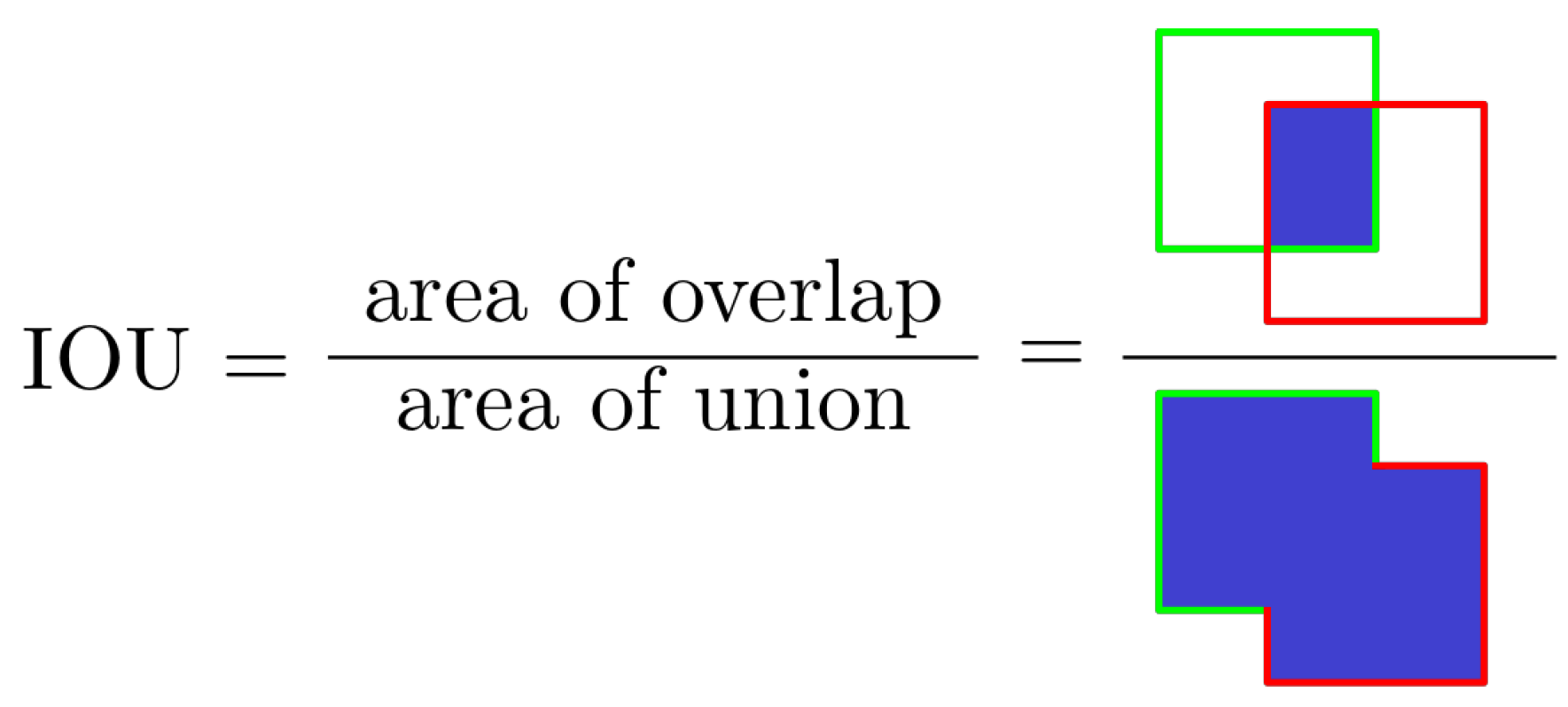
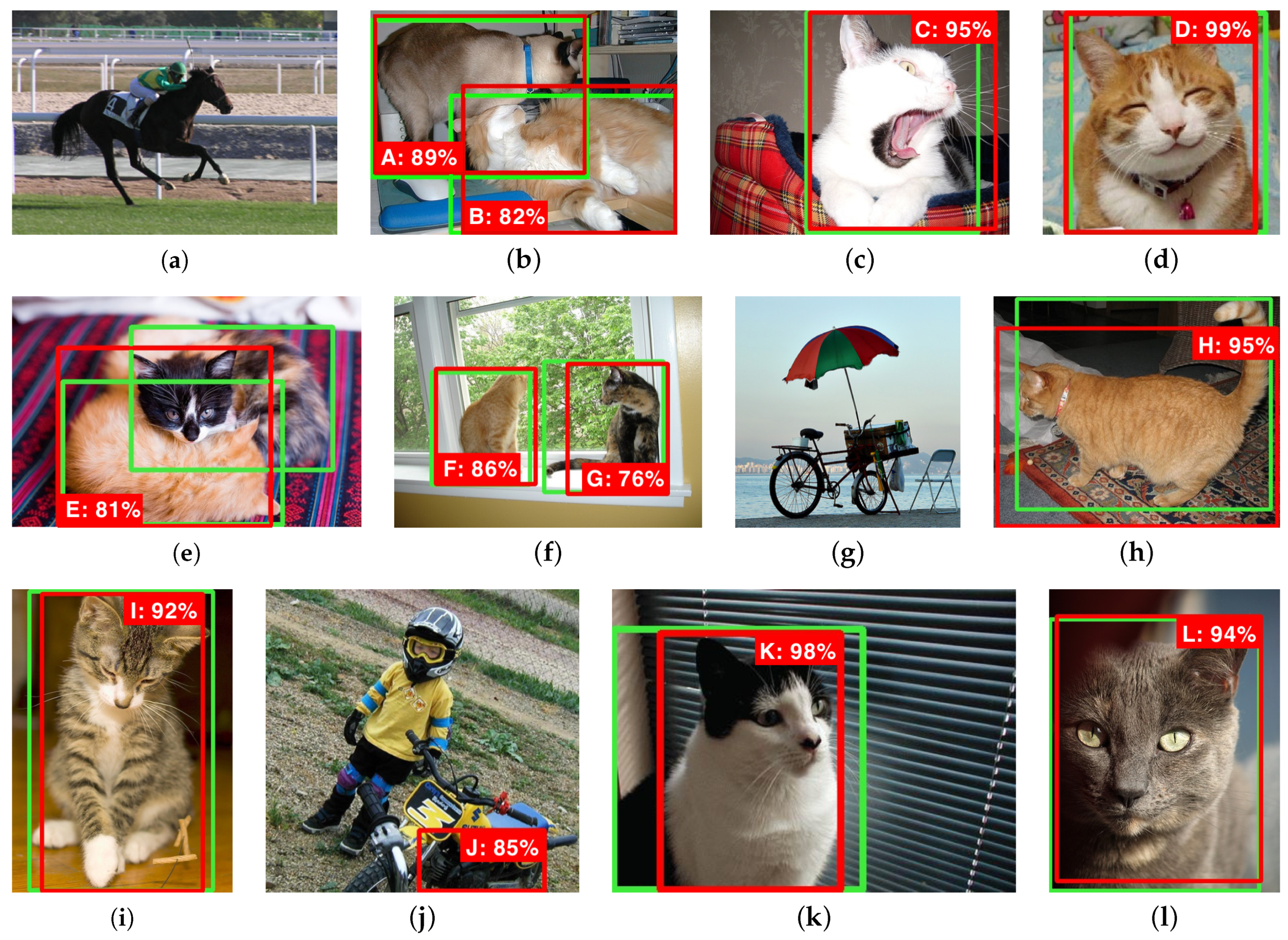

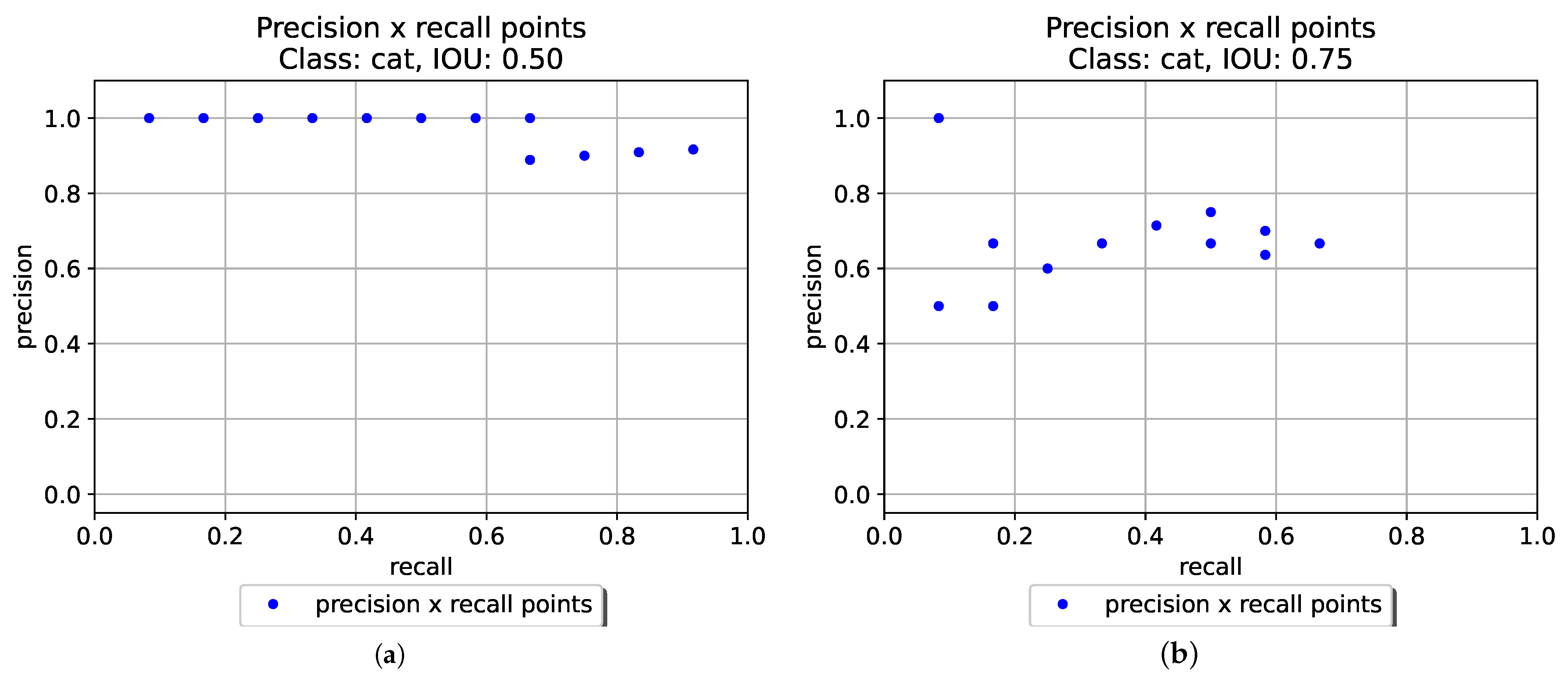
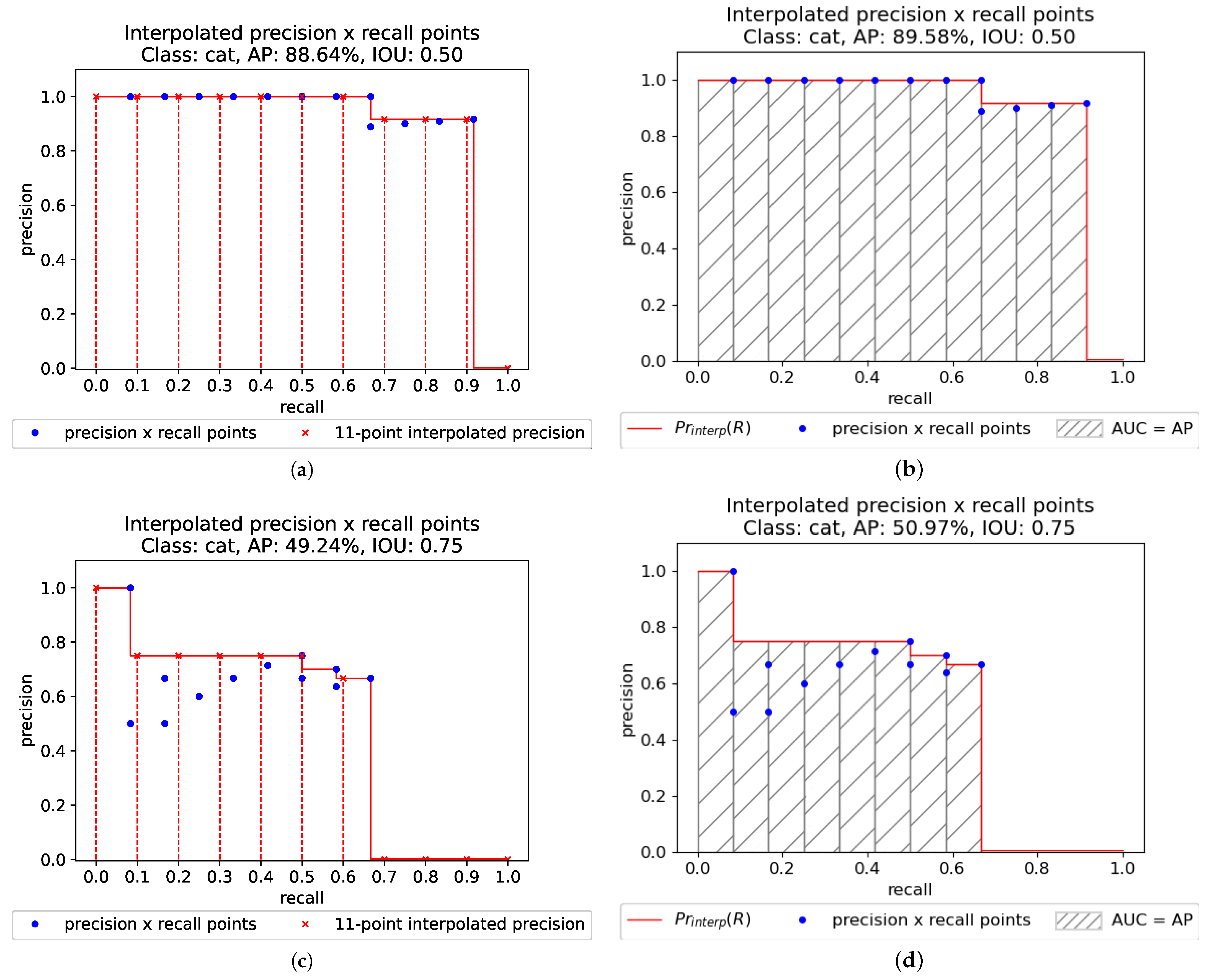
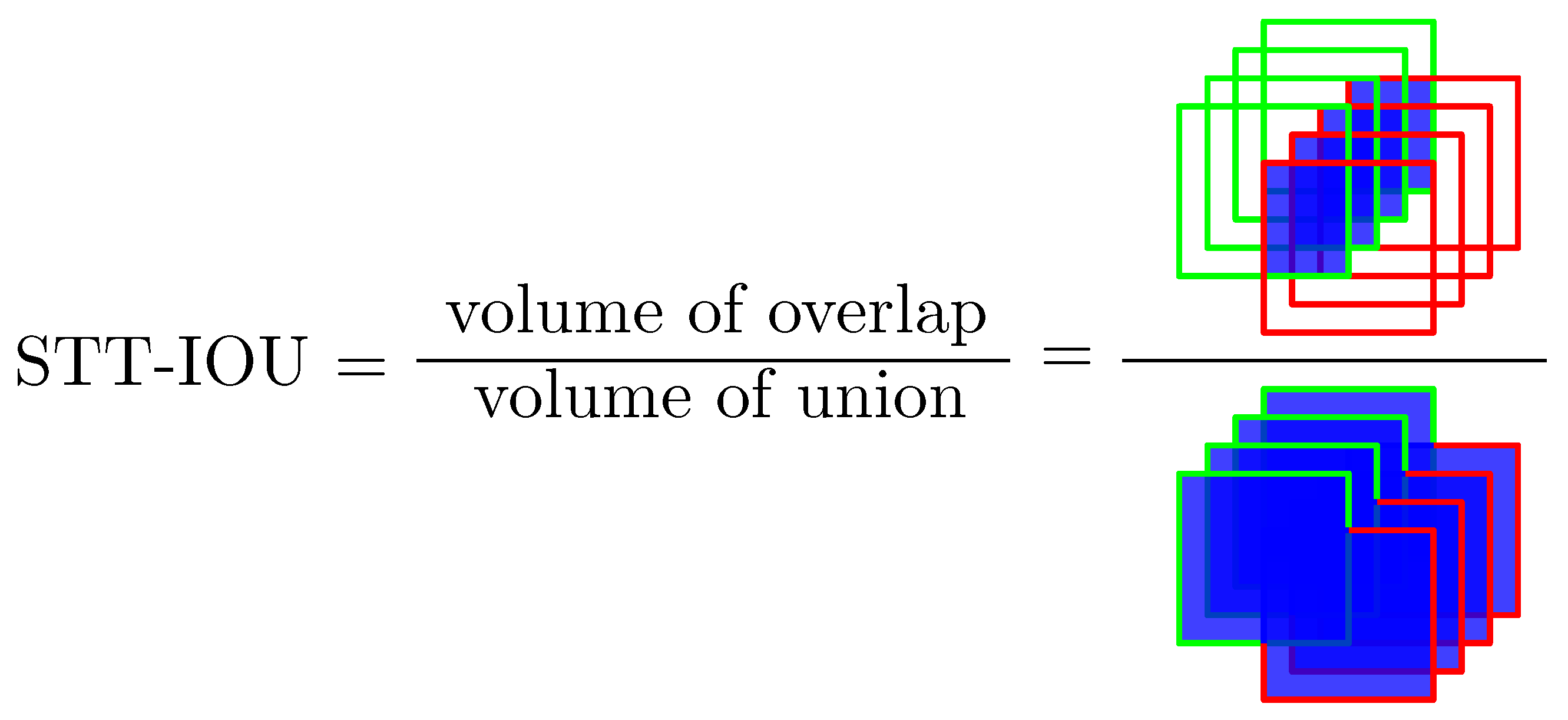
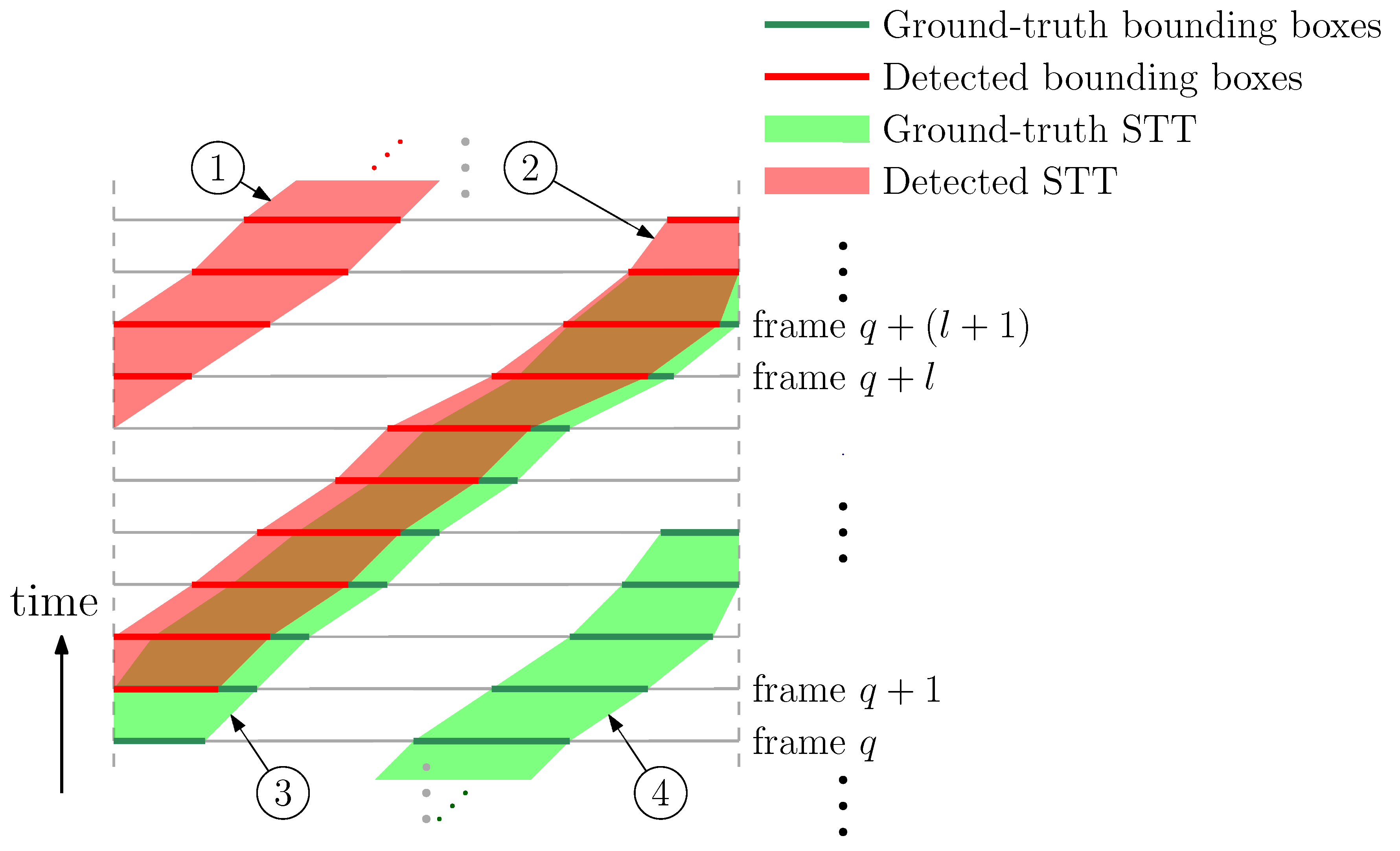
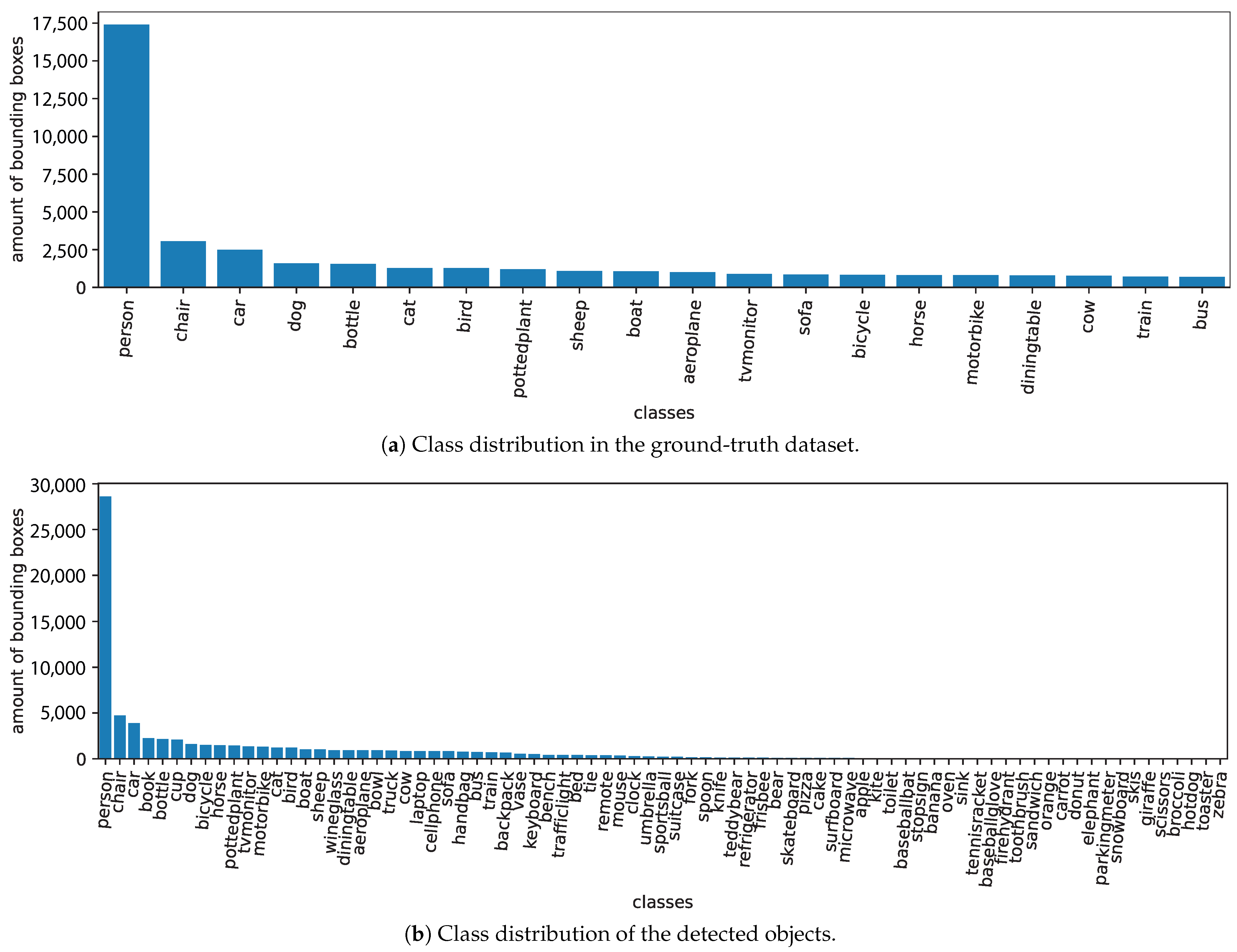
| Annotation Tool | Annotation Types | Output Formats |
|---|---|---|
| LabelMe [69] | Bounding boxes and polygons | LabelMe, but provides conversion to COCO and PASCAL VOC |
| LabelIMG [70] | Bounding boxes | PASCAL VOC and YOLO |
| Microsoft VoTT [71] | Bounding boxes and polygons | PASCAL VOC, TFRecords, specific CSV, Azure Custom Vision Service, Microsoft Cognitive Toolkit (CNTK), VoTT |
| Computer Vision Annotation Tool (CVAT) [72] | Bounding boxes and polygons | COCO, CVAT, LabelMe, PASCAL VOC, TFRecord, YOLO, and others |
| VGG Image Annotation Tool (VIA) [73] | Bounding boxes and polygons | COCO and specific CSV and JSON |
| Method | Benchmark Dataset | Metrics |
|---|---|---|
| CornerNet [76] | COCO | AP@[.5:.05:.95]; AP@.50; AP@.75; APS; APM; APL |
| EfficientDet [77] | COCO | AP@[.5:.05:.95]; AP@.50; AP@.75 |
| Fast R-CNN [53] | PASCAL VOC 2007, 2010, 2012 | AP; mAP (IOU=.50) |
| Faster R-CNN [8] | PASCAL VOC 2007, 2012 | AP; mAP (IOU=.50) |
| Faster R-CNN [8] | COCO | AP@[.5:.05:.95]; AP@.50 |
| R-CNN [52] | PASCAL VOC 2007, 2010, 2012 | AP; mAP (IOU=.50) |
| RFB Net [78] | PASCAL VOC 2007 | mAP (IOU=.50) |
| RFB Net [78] | COCO | AP@[.5:.05:.95]; AP@.50; AP@.75; APS; APM; APL |
| RefineDet [79] | PASCAL VOC 2007, 2012 | mAP (IOU=.50) |
| RefineDet [79] | COCO | AP@[.5:.05:.95]; AP@.50; AP@.75; APS; APM; APL |
| RetinaNet [80] | COCO | AP@[.5:.05:.95]; AP@.50; AP@.75; APS; APM; APL |
| R-FCN [54] | PASCAL VOC 2007, 2012 | mAP (IOU=.50) |
| R-FCN [54] | COCO | AP@[.5:.05:.95];AP@.50; APS; APM; APL |
| SSD [47] | PASCAL VOC 2007, 2012 | mAP (IOU=.50) |
| SSD [47] | COCO | AP@[.5:.05:.95]; AP@.50; AP@.75; APS; APM; APL; AR1; AR10; AR100; ARS; ARM; ARL |
| SSD [47] | ImageNet | mAP (IOU=.50) |
| Yolo v1 [48] | PASCAL VOC 2007, 2012; Picasso; People-Art | AP; mAP (IOU=.50) |
| Yolo v2 [49] | PASCAL VOC 2007, 2012 | AP; mAP (IOU=.50) |
| Yolo v2 [49] | COCO | AP@[.5:.05:.95]; AP@.50; AP@.75; APS; APM; APL; AR1; AR10; AR100; ARS; ARM; ARL |
| Yolo v3 [50] | COCO | AP@[.5:.05:.95]; AP@.50; AP@.75; APS; APM; APL; AR1; AR10; AR100; ARS; ARM; ARL |
| Yolo v4 [51] | COCO | AP@[.5:.05:.95]; AP@.50; AP@.75; APS; APM; APL |
| Yolo v5 [9] | COCO | AP@[.5:.05:.95]; AP@.50 |
| Bounding Box | Confidence | IOU | IOU > 0.5? | ∑TP | ∑FP | Pr | Rc |
|---|---|---|---|---|---|---|---|
| D | 99% | 0.91 | Yes | 1 | 0 | 1.0000 | 0.0833 |
| K | 98% | 0.70 | Yes | 2 | 0 | 1.0000 | 0.1667 |
| C | 95% | 0.86 | Yes | 3 | 0 | 1.0000 | 0.2500 |
| H | 95% | 0.72 | Yes | 4 | 0 | 1.0000 | 0.3333 |
| L | 94% | 0.91 | Yes | 5 | 0 | 1.0000 | 0.4167 |
| I | 92% | 0.86 | Yes | 6 | 0 | 1.0000 | 0.5000 |
| A | 89% | 0.92 | Yes | 7 | 0 | 1.0000 | 0.5833 |
| F | 86% | 0.87 | Yes | 8 | 0 | 1.0000 | 0.6667 |
| J | 85% | - | No | 8 | 1 | 0.8889 | 0.6667 |
| B | 82% | 0.84 | Yes | 9 | 1 | 0.9000 | 0.7500 |
| E | 81% | 0.74 | Yes | 10 | 1 | 0.9091 | 0.8333 |
| G | 76% | 0.76 | Yes | 11 | 1 | 0.9167 | 0.9167 |
| Bounding Box | Confidence () | IOU | IOU > 0.75? | ∑TP | ∑FP | Pr | Rc |
|---|---|---|---|---|---|---|---|
| D | 99% | 0.91 | Yes | 1 | 0 | 1.0000 | 0.0833 |
| K | 98% | 0.70 | No | 1 | 1 | 0.5000 | 0.0833 |
| C | 95% | 0.86 | Yes | 2 | 1 | 0.6667 | 0.1667 |
| H | 95% | 0.72 | No | 2 | 2 | 0.5000 | 0.1667 |
| L | 94% | 0.91 | Yes | 3 | 2 | 0.6000 | 0.2500 |
| I | 92% | 0.86 | Yes | 4 | 2 | 0.6667 | 0.3333 |
| A | 89% | 0.92 | Yes | 5 | 2 | 0.7143 | 0.4167 |
| F | 86% | 0.87 | Yes | 6 | 2 | 0.7500 | 0.5000 |
| J | 85% | - | No | 6 | 3 | 0.6667 | 0.5000 |
| B | 82% | 0.84 | Yes | 7 | 3 | 0.7000 | 0.5833 |
| E | 81% | 0.74 | No | 7 | 4 | 0.6364 | 0.5833 |
| G | 76% | 0.76 | Yes | 8 | 4 | 0.6667 | 0.6667 |
| Class | IOU Threshold = 0.5 | IOU Threshold = 0.75 | ||||
|---|---|---|---|---|---|---|
| 101-Point | 11-Point | All-Point | 101-Point | 11-Point | All-Point | |
| aeroplane | 0.76 | 0.79 | 0.77 | 0.57 | 0.58 | 0.58 |
| bicycle | 0.41 | 0.43 | 0.41 | 0.31 | 0.33 | 0.31 |
| bird | 0.66 | 0.67 | 0.66 | 0.49 | 0.48 | 0.50 |
| boat | 0.47 | 0.46 | 0.47 | 0.28 | 0.29 | 0.29 |
| bottle | 0.45 | 0.47 | 0.45 | 0.32 | 0.34 | 0.33 |
| bus | 0.79 | 0.78 | 0.80 | 0.74 | 0.69 | 0.74 |
| car | 0.52 | 0.53 | 0.53 | 0.39 | 0.39 | 0.39 |
| cat | 0.73 | 0.74 | 0.73 | 0.54 | 0.53 | 0.54 |
| chair | 0.41 | 0.40 | 0.41 | 0.30 | 0.32 | 0.30 |
| cow | 0.74 | 0.69 | 0.74 | 0.59 | 0.58 | 0.60 |
| diningtable | 0.44 | 0.46 | 0.44 | 0.28 | 0.31 | 0.28 |
| dog | 0.66 | 0.64 | 0.65 | 0.53 | 0.53 | 0.53 |
| horse | 0.42 | 0.43 | 0.43 | 0.35 | 0.36 | 0.35 |
| motorbike | 0.51 | 0.53 | 0.51 | 0.38 | 0.39 | 0.38 |
| person | 0.67 | 0.65 | 0.68 | 0.53 | 0.54 | 0.53 |
| pottedplant | 0.37 | 0.39 | 0.37 | 0.22 | 0.25 | 0.22 |
| sheep | 0.68 | 0.68 | 0.68 | 0.56 | 0.58 | 0.57 |
| sofa | 0.44 | 0.45 | 0.44 | 0.37 | 0.38 | 0.37 |
| train | 0.75 | 0.77 | 0.76 | 0.65 | 0.66 | 0.65 |
| tvmonitor | 0.54 | 0.55 | 0.54 | 0.43 | 0.45 | 0.43 |
| average | 0.57 | 0.58 | 0.57 | 0.44 | 0.45 | 0.44 |
| Metric | Result |
|---|---|
| APS | 0.13 |
| APM | 0.33 |
| APL | 0.46 |
| AR1 | 0.39 |
| AR10 | 0.53 |
| AR100 | 0.53 |
| ARS | 0.23 |
| ARM | 0.47 |
| ARL | 0.58 |
Publisher’s Note: MDPI stays neutral with regard to jurisdictional claims in published maps and institutional affiliations. |
© 2021 by the authors. Licensee MDPI, Basel, Switzerland. This article is an open access article distributed under the terms and conditions of the Creative Commons Attribution (CC BY) license (http://creativecommons.org/licenses/by/4.0/).
Share and Cite
Padilla, R.; Passos, W.L.; Dias, T.L.B.; Netto, S.L.; da Silva, E.A.B. A Comparative Analysis of Object Detection Metrics with a Companion Open-Source Toolkit. Electronics 2021, 10, 279. https://doi.org/10.3390/electronics10030279
Padilla R, Passos WL, Dias TLB, Netto SL, da Silva EAB. A Comparative Analysis of Object Detection Metrics with a Companion Open-Source Toolkit. Electronics. 2021; 10(3):279. https://doi.org/10.3390/electronics10030279
Chicago/Turabian StylePadilla, Rafael, Wesley L. Passos, Thadeu L. B. Dias, Sergio L. Netto, and Eduardo A. B. da Silva. 2021. "A Comparative Analysis of Object Detection Metrics with a Companion Open-Source Toolkit" Electronics 10, no. 3: 279. https://doi.org/10.3390/electronics10030279
APA StylePadilla, R., Passos, W. L., Dias, T. L. B., Netto, S. L., & da Silva, E. A. B. (2021). A Comparative Analysis of Object Detection Metrics with a Companion Open-Source Toolkit. Electronics, 10(3), 279. https://doi.org/10.3390/electronics10030279










